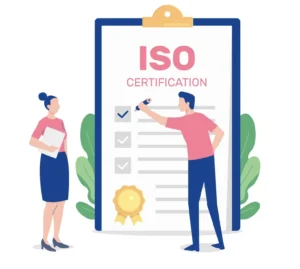Boosting Manufacturing in India with ISO Standards
India’s manufacturing sector has witnessed significant growth over the past decade, becoming a crucial pillar of the country’s economy. With initiatives like “Make in India,” the government aims to transform India into a global manufacturing hub. However, despite the sector’s expansion, challenges such as inconsistent product quality, environmental concerns, and occupational health and safety issues persist.
In the highly competitive global market, maintaining high standards of quality, environmental sustainability, and worker safety is essential for manufacturers. Quality and standards are not just about meeting regulatory requirements but also about enhancing customer satisfaction, reducing waste, improving efficiency, and building a strong brand reputation.
International Organization for Standardization (ISO) standards provide a globally recognized framework for improving various aspects of manufacturing. These standards help companies streamline their processes, enhance product quality, ensure environmental sustainability, and improve occupational health and safety. By adopting ISO standards, Indian manufacturers can gain a competitive edge, access new markets, and ensure sustainable growth.

Understanding ISO Standards
ISO standards are internationally agreed-upon guidelines that specify the requirements for products, services, and systems to ensure quality, safety, and efficiency. They are designed to be applicable across various industries and provide a framework for continuous improvement.
Overview of Key ISO Standards Relevant to Manufacturing
ISO 9001: Quality Management Systems
- Focuses on meeting customer expectations and delivering consistent quality.
- Helps organizations improve processes and increase customer satisfaction.
ISO 14001: Environmental Management Systems
- Provides a framework for managing environmental responsibilities.
- Aims to reduce environmental impact, improve resource efficiency, and ensure regulatory compliance.
ISO 45001: Occupational Health and Safety Management Systems
- Focuses on ensuring a safe and healthy workplace.
- Helps organizations reduce workplace risks and enhance employee well-being.
Benefits of ISO Certification for Manufacturing Companies
Improved Product Quality and Consistency
- Ensures products meet customer and regulatory requirements.
- Enhances reputation and customer loyalty.
- Enhanced Operational Efficiency and Cost Savings
Streamlines processes and reduces waste.
- Improves resource utilization and operational efficiency.
- Increased Market Access and Competitiveness
Facilitates entry into global markets.
- Enhances competitiveness through improved product standards.
Better Risk Management and Compliance with Regulations
- Helps identify and manage risks.
- Ensures compliance with international and local regulations.
Understanding ISO 45001
ISO 45001 provides a robust framework for managing occupational health and safety (OH&S) risks. It focuses on proactive risk prevention, employee involvement, and continual improvement to create a safe working environment.
Key Principles and Requirements of ISO 45001 Certification
1.Leadership and Worker Participation
- Emphasizes the role of leadership in establishing and maintaining an effective OH&S system.
- Encourages active participation of workers in safety initiatives.
2. Planning
- Involves identifying hazards, assessing risks, and determining preventive measures.
- Requires setting objectives and developing plans to achieve them.
3. Support
- Ensures necessary resources, training, and awareness programs are in place.
- Promotes communication and documentation of safety processes.
4. Operation
- Focuses on implementing controls to manage risks.
- Includes emergency preparedness and response procedures
5. Performance Evaluation
- Involves monitoring, measuring, and analyzing OH&S performance.
- Requires conducting internal audits and management reviews.
6. Improvement
- Emphasizes continuous improvement through corrective actions.
- Encourages innovation and proactive measures to enhance safety.
Benefits of ISO 45001 Implementation for Manufacturing Companies
1.Enhanced Worker Safety and Health
- Reduces workplace incidents and improves employee morale.
- Creates a safer and healthier working environment.
2. Compliance with Regulations
- Ensures adherence to legal and regulatory requirements.
- Minimizes the risk of fines and legal issues.
3. Improved Business Performance
- Enhances operational efficiency by reducing downtime due to accidents.
- Boosts reputation and attracts top talent.
4. Risk Management
- Identifies and mitigates potential safety hazards.
- Reduces the likelihood of accidents and associated costs.
In conclusion, adopting ISO standards can significantly boost the manufacturing sector in India by enhancing quality, ensuring sustainability, and improving safety. These standards provide a strategic advantage, helping manufacturers meet global expectations and achieve long-term success.
Steps to Implement ISO 9001 in Manufacturing
1.Gap Analysis
- Assess current processes against ISO 9001 requirements.
- Identify areas for improvement.
2. Develop Quality Management System (QMS)
- Define quality policies and objectives.
- Document processes and procedures.
3. Training and Awareness
- Train employees on ISO 9001 standards and QMS procedures.
4. Implementation
- Execute the QMS across the organization.
- Ensure all processes align with ISO 9001 requirements.
5. Internal Audit
- Conduct internal audits to check compliance and identify nonconformities.
6. Management Review
- Review the QMS performance with top management.
- Make necessary adjustments and improvements.
7. Certification Audit
- Engage an external auditor for the certification audit.
- Address any nonconformities identified during the audit.
Case Studies of Indian Manufacturers with ISO 9001 Certification
Tata Steel
- Achieved ISO 9001, ISO 14001, and ISO 45001 certifications.
- Improved operational efficiency and product quality.
- Enhanced environmental sustainability and worker safety.
Mahindra & Mahindra
- Implemented ISO 9001 and ISO 14001 across multiple plants.
- Streamlined production processes and reduced waste.
- Strengthened their global market presence.
Bajaj Auto
- Gained ISO 9001 and ISO 45001 certifications.
- Increased customer satisfaction through consistent quality.
- Prioritized employee health and safety, reducing workplace incidents.
Impact of ISO Standards on Business Performance and Growth
Enhanced Market Reputation
- Certification led to greater trust and credibility in both domestic and international markets.
- Opened new business opportunities and partnerships.
Operational Improvements
- Standardized processes resulted in higher efficiency and lower costs.
- Reduced environmental impact and compliance with regulatory requirements.
Employee Morale and Safety
- Improved workplace conditions and safety protocols boosted employee morale and productivity.
- Lower incident rates and enhanced well-being of workers.
Implementation from Leadership
- Successful implementation requires strong leadership and commitment from top management.
- Continuous communication and involvement of all stakeholders are crucial.
Comprehensive Training
- Ongoing training and development programs for employees to understand and adhere to ISO standards.
- Creating a culture of continuous improvement and quality awareness.
Effective Documentation and Monitoring
- Maintaining thorough documentation to track progress and areas for improvement.
- Regular audits and reviews to ensure compliance and identify opportunities for enhancement.
Future Trends in Manufacturing and ISO Standards
Emerging Trends in Global Manufacturing
Sustainability and Green Manufacturing
- Increasing emphasis on reducing carbon footprints and sustainable production methods.
- Adoption of circular economy principles.
Advanced Technologies
- Integration of AI, IoT, and automation in manufacturing processes.
- Enhancing efficiency and reducing human error through smart manufacturing.
Customization and Flexibility
- Shift towards more personalized and flexible manufacturing solutions.
- Meeting diverse customer demands with agile production systems.
Evolution of ISO Standards to Meet Future Manufacturing Needs
Incorporating New Technologies
- ISO standards evolving to include guidelines for implementing new technologies.
- Ensuring cybersecurity and data protection in digital manufacturing environments.
Focus on Sustainability
- Greater emphasis on environmental management and sustainability in future ISO standards.
- Encouraging manufacturers to adopt green practices and reduce waste.
Enhanced Quality and Safety
- Continuous improvement of standards to ensure high-quality products and safe workplaces.
- Adapting to changing regulatory landscapes and market demands.
Role of Digital Transformation and Industry 4.0 in ISO Standard Implementation
- Utilizing digital platforms to streamline documentation and compliance processes.
- Real-time monitoring and reporting of quality and safety metrics.
- Implementing Industry 4.0 technologies to enhance productivity and accuracy.
- Using data analytics for informed decision-making and continuous improvement.
- Combining physical processes with digital twins for better control and optimization.
- Enhancing predictive maintenance and reducing downtime.
Conclusion
ISO standards are critical for enhancing quality, efficiency, and sustainability in the manufacturing sector.
They help Indian manufacturers compete globally by ensuring consistent and high-quality products.
Avenue Consumer Brands is your trusted partner in navigating the complexities of establishing a manufacturing presence in India. Here’s how we can assist:
- Expert Guidance on Regulatory Compliance
We provide detailed insights into India’s regulatory environment, ensuring your business complies with all local laws and standards, including ISO certifications.
- Strategic Market Entry
Our market analysis helps you understand key sectors and identify lucrative opportunities, allowing you to make informed decisions about where to invest.
- Building Local Partnerships
We facilitate connections with reliable local partners, suppliers, and stakeholders, ensuring smooth operations and robust supply chains.
- Infrastructure and Logistics Support
We assist in assessing and securing the best infrastructure for your manufacturing needs, along with optimizing logistics to reduce costs and improve efficiency.
- Cultural Integration and Business Practices
Our expertise in Indian cultural and business practices ensures seamless integration and communication with local teams, enhancing operational harmony and productivity.
- Ongoing Support and Improvement
We provide continuous support to help you maintain and improve your management systems, ensuring sustained compliance and performance.
Embark on your manufacturing journey in India with confidence and expertise. Contact Avenue Consumer Brands today to explore how we can help you capitalize on the immense opportunities in India’s thriving manufacturing sector. Together, we can achieve success and growth in this dynamic market.



Can you be more specific about the content of your article? After reading it, I still have some doubts. Hope you can help me.
I don’t think the title of your article matches the content lol. Just kidding, mainly because I had some doubts after reading the article. https://accounts.binance.com/cs/register?ref=S5H7X3LP
Your point of view caught my eye and was very interesting. Thanks. I have a question for you. https://accounts.binance.com/fr/register?ref=GJY4VW8W
Your article helped me a lot, is there any more related content? Thanks!
I don’t think the title of your article matches the content lol. Just kidding, mainly because I had some doubts after reading the article.
Your point of view caught my eye and was very interesting. Thanks. I have a question for you.
I don’t think the title of your article matches the content lol. Just kidding, mainly because I had some doubts after reading the article. http://柴犬多少钱.cryptostarthome.com
Thank you, your article surprised me, there is such an excellent point of view. Thank you for sharing, I learned a lot.
Thank you for your sharing. I am worried that I lack creative ideas. It is your article that makes me full of hope. Thank you. But, I have a question, can you help me? https://www.binance.com/join?ref=P9L9FQKY
Thank you for your sharing. I am worried that I lack creative ideas. It is your article that makes me full of hope. Thank you. But, I have a question, can you help me?
Thanks for sharing. I read many of your blog posts, cool, your blog is very good.
Can you be more specific about the content of your article? After reading it, I still have some doubts. Hope you can help me.
Thank you for your sharing. I am worried that I lack creative ideas. It is your article that makes me full of hope. Thank you. But, I have a question, can you help me?
I don’t think the title of your article matches the content lol. Just kidding, mainly because I had some doubts after reading the article.
Thank you for your sharing. I am worried that I lack creative ideas. It is your article that makes me full of hope. Thank you. But, I have a question, can you help me?
Can you be more specific about the content of your article? After reading it, I still have some doubts. Hope you can help me.
Thanks for sharing. I read many of your blog posts, cool, your blog is very good.
Thank you for your sharing. I am worried that I lack creative ideas. It is your article that makes me full of hope. Thank you. But, I have a question, can you help me?
Your article helped me a lot, is there any more related content? Thanks! https://www.binance.info/register?ref=IHJUI7TF
Thanks for sharing. I read many of your blog posts, cool, your blog is very good. https://accounts.binance.info/fr/register?ref=T7KCZASX
Thanks for sharing. I read many of your blog posts, cool, your blog is very good.
Can you be more specific about the content of your article? After reading it, I still have some doubts. Hope you can help me.
Thank you for your sharing. I am worried that I lack creative ideas. It is your article that makes me full of hope. Thank you. But, I have a question, can you help me? https://accounts.binance.info/ru/register-person?ref=O9XES6KU
Your point of view caught my eye and was very interesting. Thanks. I have a question for you.
Your point of view caught my eye and was very interesting. Thanks. I have a question for you.
I don’t think the title of your article matches the content lol. Just kidding, mainly because I had some doubts after reading the article. https://accounts.binance.com/sl/register?ref=I3OM7SCZ